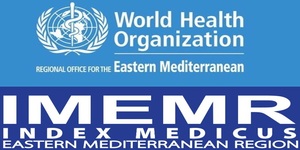Reaction toTerror-related Posttraumatic Stress Disorder (PTSD) amongthe Students of Nursing College/ University of Baghdad
DOI:
https://doi.org/10.36321/kjns.vi20153.2717Keywords:
Reaction, PTSD, terror, related, students, college, nursingAbstract
Background: Posttraumatic Stress Disorder (PTSD) is a term applied to psychological and emotional disturbance that develops after experiencing, witnessing or being exposed to a traumatic event. The event may involve actual or threatened death, serious physical injury or threat to physical integrity such as a natural disaster, wartime combat, torture, murder, severe harm to oneself or others, rape, and violent attack or an assault.
Objectives: To determine the infliction levels of Posttraumatic Stress Disorder (PTSD) among the students in the college of Nursing/ University of Baghdad, and to find out the relationship between these levels and some demographic characteristics.
Methodology: Observational design study of undergraduate nursing students has been achieved in December 4th, 2013 to the May 17th, 2014 in order to identify the Post-traumatic Stress Disorder in all stages in the College of Nursing University of Baghdad. A non-probability of two hundred students in all four stages of the college of Nursing/ University of Baghdad was recruited. To meet the study objectives a questionnaire was constructed. This questionnaire consisted of two parts: firstly, four demographic characteristics: gender, age, stage, and residency; and 17 items represent Davidson Trauma scale-DSM-IV for diagnosing and measuring levels of PTSD within the civilians. Data were analyzed by applying: descriptive statistical analysis: frequencies and percentages and distribution; and inferential analysis: Correlation Coefficient, Chi-squire, and independent t-test.
Results: The study indicates that the majority of the students (63.0%) has PTSD: low (29.0%), medium (21.5%),
and high (12.5%); and only 37.0% of them have no PTSD. The results indicate that 35.0% of the participants who
have different levels of PTSD (63.0%) are female; and 21.5% of those who have PTSD are in age group (≥ 24);
for the stages: the first stage shows having more PTSD (18.0%) than the other stages; and finally, 42.0% of those
who live in Baghdad have levels of PTSD than those who do not live in Baghdad.
Conclusions: The results of present study indicated that more than half of participated students were at age 22
years and more old; half of them were male students; and the majority live in Baghdad. The study showed that a
high percentage of those students have had PTSD in different levels.
Recommendations: The present study recommends that students are to be advised to learn some coping strategies
and stress managements by attending training and relaxation sessions.
Downloads
Downloads
Published
How to Cite
Issue
Section
License
Copyright (c) 2022 Dr. Maan H. Ibrahim Al-Ameri

This work is licensed under a Creative Commons Attribution 4.0 International License.













